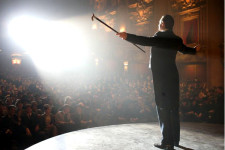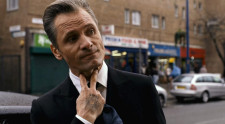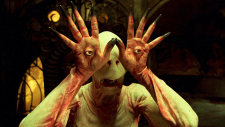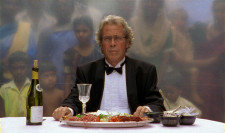(For each filmmaker, the listed movies are among my top 100 of the decade and are ranked in rough order of preference – i.e., the first movie is my favorite.)
Christopher Nolan
Memento
The Prestige
The Dark Knight
Batman Begins
 Nolan directed five movies released this decade; two of them are nearly perfect, one of them has unparalleled rigor for a superhero movie, and the other one has Heath Ledger’s Joker casting an enormous shadow over (and therefore obscuring) its many flaws. The unnecessary remake of Insomnia was the necessary bridge between Memento and Batman Begins – from independent to studio work – but beyond it Nolan has made nothing but winners.
Nolan directed five movies released this decade; two of them are nearly perfect, one of them has unparalleled rigor for a superhero movie, and the other one has Heath Ledger’s Joker casting an enormous shadow over (and therefore obscuring) its many flaws. The unnecessary remake of Insomnia was the necessary bridge between Memento and Batman Begins – from independent to studio work – but beyond it Nolan has made nothing but winners.
To be clear, I don’t believe Nolan is a great filmmaker, and I’m skeptical he’ll ever equal any of these four movies, even though he hasn’t yet turned 40. The articulation and repetition of themes within dialogue (an unfortunate tendency after Memento) indicates that he doesn’t trust the audience, and The Dark Knight shows that he’s not very good at narrative problem-solving – how to show this clearly (the skyscraper climax, for example) or resolve this loose end satisfyingly (everything from the ferry situation on). Batman Begins brought fair charges that he has difficulty choreographing and framing action sequences, and The Dark Knight was even worse.
Yet Nolan as a writer is exceptionally good at packing entertainments with thematic richness. Count the layers of corruption in Batman Begins (I end up with six), and notice three distinct self-righteous characters, with their approaches to doing “good” contrasted effectively without ever being belabored. The Prestige is a dense study of subverted identity and headstrong sacrifice, but it is first and foremost a tricky and kicky period thriller.
Put differently, his true gift is as a conceptual artist and architect, cleverly designing and building challenging, subtly daring movies around characters and ideas without losing sight of the story or audience.
The Prestige is premised on two polar-opposite secrets – one revealed gradually, the other suddenly – that make it nearly impossible to “solve” both parts of the puzzle on first viewing. Batman Begins spent an hour on glorified prologue before showing the Caped Crusader, yet those patient 60 minutes are integral in plot and theme. And The Dark Knight grabbed the suggestion of escalation in Batman Begins and took it to logical conclusions, with armed Batman wannabes, the Joker, Harvey Dent with his idealistic belief in the system burned away, and the title character with an erratic moral compass.
His second-best movie of the decade is The Prestige, and it saddens me that it didn’t engender the kind of fevered, lavish scrutiny that Memento and The Dark Knight did. Adapted relatively faithfully from the solid Christopher Priest novel, Nolan’s movie nonetheless has slightly different concerns, and it finds a perfect balance of darkness, humor, mystery, and resonance. The script’s mechanics reveal themselves on second or third viewing, and it’s a marvel of both misdirection and foreshadowing – a fantastic magic trick.
Memento’s genius is the way that the movie’s construction is used to create audience empathy; we understand the challenges Leonard faces because we experience similar issues figuring out where and when we are, and what we’re doing here, and what just happened. As with The Prestige, it’s easy to give in to the movie, but from its opening shot forward, it’s meticulously, gorgeously crafted as a narrative experience.
Best of all, Nolan had a confidence then that he’s never been able to recapture. Memento’s seeming ambiguity is actually something different: It’s a filmmaker willing to let the audience find the latent truth on its own.
Pixar
WALL•E
The Incredibles
Up
Finding Nemo
 Pixar could be said to have resurrected the idea of movies for the whole family, but I don’t think that’s true. The Incredibles is for middle-aged folks. Up is for old people, and those of us afraid of what we might be when we’re old. WALL•E speaks of loneliness, first love, and the consequences of rampant consumerism.
Pixar could be said to have resurrected the idea of movies for the whole family, but I don’t think that’s true. The Incredibles is for middle-aged folks. Up is for old people, and those of us afraid of what we might be when we’re old. WALL•E speaks of loneliness, first love, and the consequences of rampant consumerism.
Kids might like or love any of these movies, but they won’t really get or feel them. Pixar is making movies that they can grow into and up with, and that the rest of us can love without reservation or shame.
David Cronenberg
Camera
Eastern Promises
Spider
A History of Violence
 An odd thing happened with David Cronenberg this decade. He forsook his trademark body/biological horror and began making movies that were, on the surface, conventional.
An odd thing happened with David Cronenberg this decade. He forsook his trademark body/biological horror and began making movies that were, on the surface, conventional.
This wasn’t a gradual thing, really. His 1999 film eXistenZ had a serious anal fixation and played like a remake of his own Videodrome, and it ended a decade that also included the grotesqueries of Naked Lunch and Crash. So the feature trio of Spider, A History of Violence, and Eastern Promises looks positively mainstream by comparison.
It’s anything but. What Cronenberg seemed to discover this past decade was subtlety – not the blink-and-you’ll-miss-it variety, but a reliance on tone and performance rather than gooey special effects or sexual deviancy. While his movies in the past have been unsettling because of the way they tap into and embody fear and disease, his recent movies have been fundamentally psychological.
Spider is an inside-out adaptation of one of my favorite books, as author and screenwriter Patrick McGrath turned the novel’s narrator into a movie character who produces few intelligible words. The gothic portrait of mental illness – in which Ralph Fiennes as the title character is largely a collection of tics – mines and cleverly visualizes memory and fantasy, and although its ultimate revelation is no surprise, it also isn’t the point. Spider feels like an all-access pass to a dark, private place.
The other three movies here are about dual identity, and more specifically about what we actually are even though we imagine ourselves as something else.
A History of Violence is, like its protagonist, bifurcated, and I think it’s a little too broad in its small-town clich – s to be entirely successful. But it has an exquisite, unresolvable tension that is given voice by one question posed about Viggo Mortensen’s seemingly simple diner owner: “How come he’s so good at killing people?”
Something about Mortensen obvously inspired Cronenberg, because his next movie – Eastern Promises – also stars the actor, and has a nearly identical central theme. It has a similarly bizarre architecture, in the sense that the revelation that Mortensen’s gangster/driver Nikolai is an undercover cop seems to be a twist for a twist’s sake; the movie ends shortly thereafter, and his real identity barely furthers the plot.
Yet the genius of the movie – why it’s so good beyond its tightly circumscribed mob/nurse/baby plot – is that Cronenberg doesn’t do anything with the r
evelation; he lets it work by implication. The final shot, echoing The Godfather Part II, shows Nikolai – finally the “king,” in his parlance – sitting pensively in the restaurant, and we project into a mind that he has declared blank: “I’m just a driver.” We consider the tattoos, and the evil that he’s done and seen in this law-enforcement assignment. He has put himself at risk by saving people, but we wonder how much of the good guy has been devoured by the bad one. He remains an enigma, but one senses regret, accentuated by the lovely, mournful eastern-European violin theme.
Best of all from Cronenberg this decade is Camera, an ostensibly whimsical six-minute short. It’s basically a monologue spurred by those darned kids bringing a movie camera into a house, but the crotchety yet indulgent speaker has existential concerns: aging, death, the way a film gave him a disease in his dream … . As compact as Croneberg’s feature films are, this one packs a ton into a very small space, and it is the most playful he’s ever been.
Guillermo del Toro
Pan’s Labyrinth
The Devil’s Backbone
 An apparent believer in Scorsese’s “one for me, one for them” philosophy, Guillermo del Toro has made a Blade movie and two Hellboys for “them” this decade. And if those mean that he’ll continue to make the occasional brilliant personal movie, that’s fine by me. The writer/director has grounded these two films – one a dark fairy tale, the other a ghost story – in history and a genuine sense of time and place, and as a result the vivid, beautifully executed fantastic elements have even more authority and resonance.
An apparent believer in Scorsese’s “one for me, one for them” philosophy, Guillermo del Toro has made a Blade movie and two Hellboys for “them” this decade. And if those mean that he’ll continue to make the occasional brilliant personal movie, that’s fine by me. The writer/director has grounded these two films – one a dark fairy tale, the other a ghost story – in history and a genuine sense of time and place, and as a result the vivid, beautifully executed fantastic elements have even more authority and resonance.
But what really sets del Toro apart is his empathy with children combined with his adult sophistication; he is in that way the anti-George Lucas.
Lars von Trier
The Five Obstructions
Dancer in the Dark
Dogville
 I do not begrudge those who hate the agitating Dane; Lars von Trier makes it easy, as the documentary The Five Obstructions shows him to be, bluntly, a cruel asshole. (This is something that can be inferred from Breaking the Waves, Dancer in the Dark, and Dogville; seeing the man in action, though, is something else entirely.) Yet there aren’t many filmmakers who, in 10 years, could produce three so stylistically disparate movies along with the marriage horror show Antichrist (which I have not yet seen). And three so disparate movies that are so distinctly good. The Brechtian Dogville might be a baffling slog to most viewers – it was for me for much of its running length – but its perfectly calibrated conclusion justifies it. Dancer in the Dark combines grim, melodramatic tragedy with the widescreen musical, and there’s naked authenticity in the central performance by Bj – rk that’s positively heartbreaking; she’s different from the typical von Trier abused heroine.
I do not begrudge those who hate the agitating Dane; Lars von Trier makes it easy, as the documentary The Five Obstructions shows him to be, bluntly, a cruel asshole. (This is something that can be inferred from Breaking the Waves, Dancer in the Dark, and Dogville; seeing the man in action, though, is something else entirely.) Yet there aren’t many filmmakers who, in 10 years, could produce three so stylistically disparate movies along with the marriage horror show Antichrist (which I have not yet seen). And three so disparate movies that are so distinctly good. The Brechtian Dogville might be a baffling slog to most viewers – it was for me for much of its running length – but its perfectly calibrated conclusion justifies it. Dancer in the Dark combines grim, melodramatic tragedy with the widescreen musical, and there’s naked authenticity in the central performance by Bj – rk that’s positively heartbreaking; she’s different from the typical von Trier abused heroine.
The Five Obstructions, meanwhile, is a great introduction to how formal cinematic elements – editing, for example – dictate meaning. (In the movie, Von Trier forces his filmmaking idol to re-make a classic short movie five times, each with a different set of rules.) It’s also lighter and clearer and more fun than anybody could expect from von Trier.
(This article originally appeared in the River Cities’ Reader.)


No mention of the Dark Knight’s philosophical undercurrents? I suppose credit goes the writer instead of the director.
j: Personally, I think Batman Begins was better in that regard, and it didn’t italicize its philosophical undercurrents in the dialogue (as much). That’s why it’s singled out and not The Dark Knight.